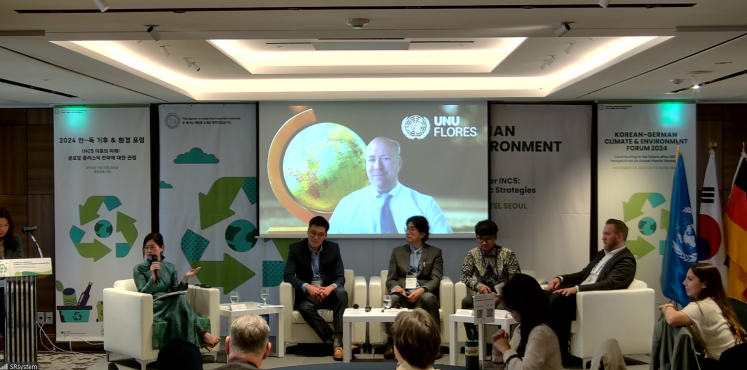On November 22, 2024, the second session of the 2024 Korean-German Climate and Environment Forum, co-hosted by the German Embassy in Republic of Korea (ROK) and the United Nations Development Programme Seoul Policy Center (UNDP-SPC), as part of the German Embassy Climate Talks Series, “The Next Step in Plastic Sustainability – Latest Technologies and Innovations in Plastic Waste Management” took place.
Experts Discuss Innovative Solutions for Sustainable Plastics at International Forum
The expert panel discussed recent trends and innovative solutions for plastics sustainability, featuring insights from global leaders from Fraunhofer Representative Office Korea, Korea Plastic Industry Cooperative, Indonesian Forum for Environment (WALHI), Rieckermann (a German company group focussing on industrial solutions) and UNU-FLORES. Prof. Daniel Karthe attended the event as a representative panellist for the UNU-FLORES.
The forum discussed recent advances in plastic recycling and waste management technologies, focusing on their potential for implementation in areas with limited resources and infrastructure. Dr. Karthe highlighted the significant differences between waste management systems in developed countries such as Korea and the EU and those in the Global South and highlighted that the biggest challenge is to reduce plastic usage and increase collection rates of plastic waste before addressing recycling or disposal. Simple measures such as banning certain single-use plastic items and implementing deposit-fee systems for PET bottles have been shown to be successful in increasing recycling rates. While mechanical recycling is currently the most viable option for less developed countries, thermal recycling can be considered if other options are not available. Chemical recycling might play a role in the future but is currently of little relevance for countries in the Global South.
Looking ahead, Dr. Karthe pointed to “design for recycling” as a game-changing innovation for developed and developing countries in the next decade. This approach involves creating packaging from a single material that can be recycled easily. Completely transparent materials such as some beverage bottles currently sold in the Republic of Korea are a good example and can particularly help in areas where sorting and recycling capacity are limited. In addition, Prof. Karthe emphasized that the long-term trend of ever-increasing amounts of packaging materials must be reversed, and that reusable packaging solutions must play a bigger role in the future. He stressed the need for multilateral cooperation to address global environmental challenges like plastic pollution, for which local efforts need to be embedded in global strategies.
Advancing and implementing a Global Plastic Treaty
The Korean-German Climate and Environment Forum directly preceded the final round of international negotiations for an international legally binding instrument for ending plastic pollution which takes place in Busan from 25 November to 1 December 2024. Prof. Karthe’s participation in the forum also provided a good opportunity to showcase the Resource Nexus Approaches to Sustainability Transformations in Plastic and Packaging Material Use, Reuse and Reduction (TRANS-PLAST) project that UNU-FLORES currently conducts in collaboration with Korea Environment Corporation (K-eco), and which through a knowledge exchange between the Republic Korea and the European Union contributes to a more sustainable management of plastics.
The recorded event is available here


